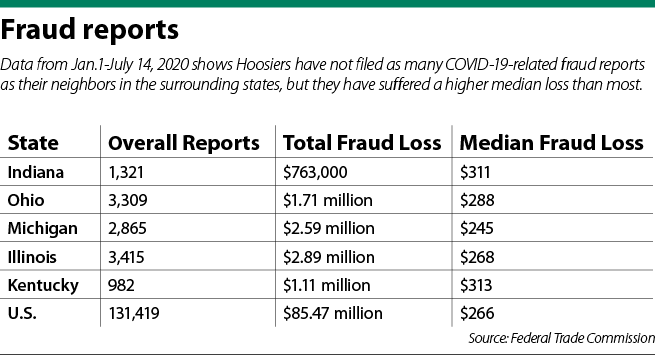Subscriber Benefit
As a subscriber you can listen to articles at work, in the car, or while you work out. Subscribe Now Since the coronavirus pandemic hit in March, the rise in consumer complaints made to the Federal Trade Commission has proven scammers follow the news.
Since the coronavirus pandemic hit in March, the rise in consumer complaints made to the Federal Trade Commission has proven scammers follow the news.
Schemes to con people out of their stimulus checks, to get money for face masks that are never delivered and to get payments for bogus COVID-19 treatments or cures have been reported. In fact, the FTC has a special coronavirus page on its website devoted to advising consumers on how to identify real contact tracers and to ignore offers for home test kits.
Since the beginning of the year and through July 14, the FTC has received 131,419 consumer reports of fraud, which has resulted in a loss of $85.5 million. In Indiana, the reports have reach 1,321 for a total loss of $763,000.
The scams are expected to continue as long as the outbreak remains a threat.
“I think the next wave of scams is going to be related to the economic impact of the pandemic,” said Todd Kossow, Midwest region director for the FTC.
Unemployment at historic levels and the potential end to mortgage forbearance issued under the Coronavirus Aid, Relief, and Economic Security (CARES) Act could spur a lot of deceit like that seen during the Great Recession. Lots of scams related to mortgages and debt from credit cards or student loans cropped up in 2008, and Kossow anticipates they could return.
Betsy DeNardi, director of the Consumer Protection Division in the Indiana Attorney General’s Office, said the complaints from Hoosiers have changed since COVID-19 arrived. Initially consumers were calling with reports of suspected price gouging. Then they phoned with complaints about problems getting refunds for canceled vacations and wedding rentals as well as concerns about landlords and eviction issues.
The division has “expedited its review in a couple of matters to ensure potential unlawful behavior is address as quickly as possible,” DeNardi said.
One scam that has caught the attention of the FTC had previously been litigated by the Indiana Attorney General.
The FTC filed a complaint in June against Traffic Jam Events and owner David Jeansonne II for allegedly deceiving consumers by sending mailers that supposedly directed them on how to obtain federal COVID-19 stimulus benefits.
The mailers led consumers to believe they could obtain stimulus relief temporarily in person and could claim the “stimulus incentives” at the relief headquarters in Florida.
However, when consumers arrived, they only found a lot selling used cars, according to the the FTC. The complaint, Federal Trade Commission v Traffic Jam Events LLC and David J. Jeansonne II, 2:20-cv-1740, was filed in the U.S. District Court for the Eastern District of Louisiana for “unfair or deceptive acts or practices in or affecting commerce.” Along with a permanent injunction, the commission is seeking a refund for consumers.
In 2018, the Indiana Attorney General filed a suit against Traffic Jam Events in Marion Superior Court.
The company was accused of sending mailings to thousands of Indiana consumers claiming they had won a specific prize like $5,000 or an iPad. According to the complaint, consumers were directed to go to the sponsoring auto dealership to claim their prize, but once there, they were subjected to a sales pitch to buy a vehicle. Eventually they were awarded their “prizes,” typically a $5 gift card.
A settlement agreement in State of Indiana v. Traffic Jam Events, LLC, 49D10-1806-PL-021546, was presented to the court in February 2019. Traffic Jam Events agreed to pay a $57,500 penalty and include disclosures and the odds of winning on its mailing and cooperate in any litigation the Indiana Attorney General might file against the auto dealers.
Typically, the FTC will send a warning letter to the individual or organization when the agency identifies a scam, Kossow said. The party is then given 48 hours to respond. If the individual or organization does not stop, the FTC will pursue legal action.
DeNardi said Indiana laws work well in combating these kinds of cases.
“I think the statutes we have in place will address any scam that we see,” she said.•
Please enable JavaScript to view this content.
